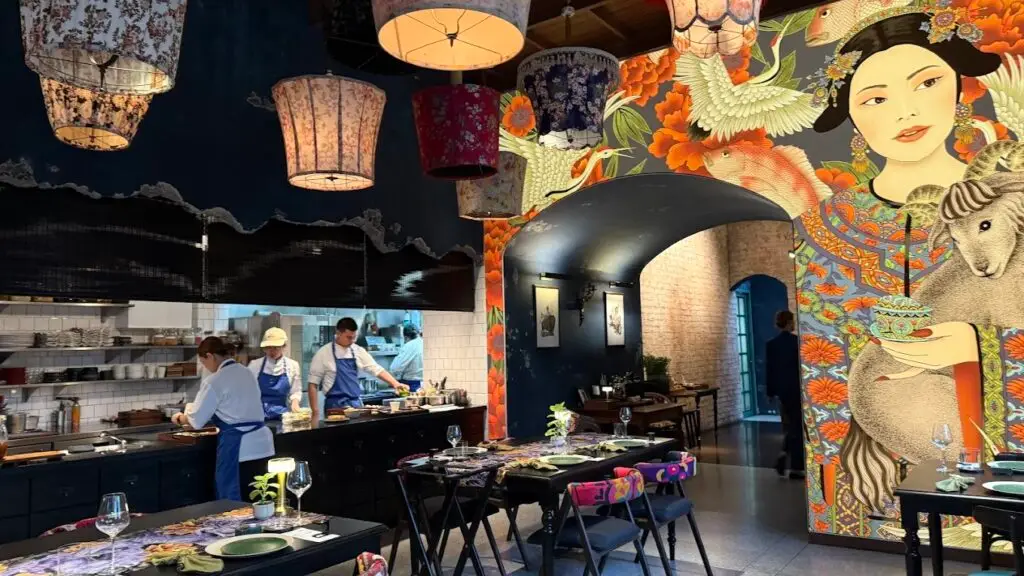In the heart of Bangkok’s bustling streets, a restaurant is quietly revolutionizing the fine dining scene with a radical commitment to local ingredients and sustainability. GOAT Bangkok isn’t just serving food—it’s telling the story of Thailand, one province at a time.
Established in late 2020, GOAT Bangkok emerged from Chef Tan-Parkorn Kosiyapong’s vision to celebrate Thailand’s rich culinary heritage through the lens of his own Thai-Chinese background. The restaurant’s name pays homage to the zodiac year of the chef’s birth, but it has quickly become synonymous with something far greater: a new standard for sustainable, locally-sourced fine dining in Southeast Asia.
Housed in a stunning Sino-Portuguese architectural setting, GOAT reflects the multicultural influences that have shaped Thailand’s culinary landscape for centuries. The dining room’s open kitchen concept allows guests to witness the artistry behind each dish, creating an immersive experience that goes beyond the plate.
What sets GOAT apart is its unique approach to menu design. Each dish is named after the Thai province from which its key ingredients are sourced, creating a culinary map of the kingdom. This concept transforms dining into a journey across Thailand’s diverse regions, from the mountainous north to the tropical south, each with its distinct flavors and traditions.
The restaurant describes its cuisine as “offbeat Thai-Chinese,” a fusion that reflects Chef Tan-Parkorn’s heritage and training. With experience from a three-star Michelin restaurant, he brings international techniques to bear on purely Thai ingredients, creating dishes that are both familiar and revolutionary.
In 2024, GOAT made a bold commitment that would challenge even the most experienced restaurateurs: sourcing 100% of ingredients from within Thailand. This decision meant finding local alternatives for traditionally imported luxury items like caviar, Wagyu beef, and premium seafood.
The challenge extended beyond main ingredients to every component of each dish. The restaurant now uses fish sauce exclusively from the Poo Yai Dang factory, made from herring caught by local fishermen. Thai sugar, special rice varieties, and locally-grown herbs complete the picture, creating a truly indigenous fine dining experience.
This commitment to local sourcing has revealed the incredible diversity of Thai ingredients. Rather than limiting creativity, the restaurant has discovered how harmoniously ingredients from different regions and cultures can work together, showcasing the unity and balance of Thailand’s regional cuisines.
GOAT’s environmental commitment extends far beyond ingredient sourcing. The restaurant has implemented a comprehensive sustainability program that addresses waste, energy use, and local ecosystem support. Their goal is ambitious: achieving zero waste in their operations.
The restaurant grows its own herbs and edible flowers, despite the considerable challenge of limited space in Bangkok’s urban environment. These garden-to-table ingredients represent 16% of their produce needs, with each plant chosen for its low space requirements and high culinary value.
Food waste is transformed into bio-fertilizer through a sophisticated composting system that converts organic waste every three months. This compost is then returned to the farmers who supply the restaurant, creating a closed-loop system that benefits both the restaurant and its suppliers.
Even the fermented compost liquid (EM) serves multiple purposes. It’s used to reduce odors and break down grease in the restaurant’s drain systems, while the concentrated liquid is sent to farmers who can use it to refertilize soil on a larger scale—just 15 ml of EM compost per 1,000 ml of water makes it an efficient solution for agricultural use.
The restaurant’s commitment to sustainability extends to its tableware, featuring recycled plates made from natural materials including chicken eggs. These eco-friendly dishes complement the menu’s theme while reducing environmental impact, proving that sustainability and elegance can coexist.
GOAT’s commitment to Thai ingredients extends to its beverage program, which emphasizes Thai drinks and innovative pairings. The restaurant offers a curated wine list alongside unique Chiang Dao mead pairings, herbal tea sets from their own garden, and cocktails featuring traditional Thai fermentation techniques.
This beverage philosophy transforms the dining experience into a complete exploration of Thai flavors, from the appetizer to the final sip. The inclusion of traditional fermentation techniques in cocktails and mocktails demonstrates how ancient Thai methods can be adapted for modern palates.
The restaurant’s open kitchen concept creates theater around the cooking process, allowing diners to witness the precision and artistry that goes into each dish. This transparency reflects the restaurant’s broader philosophy of openness about their ingredients, methods, and sustainability practices.
Guests can observe the careful preparation of dishes named after provinces like Chiang Mai, Phuket, or Isan, each representing the unique flavors and ingredients of its namesake region. This visual element adds an educational component to the dining experience, making each meal a lesson in Thai geography and culture.
GOAT’s commitment to Thai ingredients has created a robust network of relationships with local farmers and fishermen. This support system extends beyond simple purchasing to include sharing composted materials and promoting sustainable agricultural practices.
The restaurant has discovered that this approach is “far more enriching than sourcing from just one province,” as it showcases the diversity and harmony possible when different regional ingredients are combined thoughtfully. This philosophy reflects Thailand’s own multicultural heritage, where influences from various regions and cultures have blended to create something uniquely Thai.
“GOAT Bangkok represents more than just a restaurant—it’s a model for how fine dining can honor local traditions while pushing culinary boundaries. By proving that world-class cuisine can be created entirely from local ingredients, the restaurant challenges both diners and other restaurateurs to reconsider their relationship with ingredients and sustainability.“
The restaurant’s success demonstrates that environmental responsibility and culinary excellence are not opposing forces but complementary goals. Through their innovative approach to waste reduction, local sourcing, and community support, GOAT has created a dining experience that nourishes both guests and the broader Thai food ecosystem.
As Thailand’s culinary scene continues to evolve, GOAT Bangkok stands as a beacon of what’s possible when tradition meets innovation, when local ingredients are elevated to fine dining standards, and when sustainability becomes not just a practice but a philosophy that infuses every aspect of the dining experience.
For those seeking to understand Thailand through its flavors, GOAT offers an unparalleled journey—one that honors the past while boldly embracing the future of conscious cuisine.
GOAT Bangkok is located in the heart of Bangkok and offers a unique fine dining experience that celebrates Thai ingredients and sustainability. Reservations are recommended for this intimate dining experience.
GOAT BANGKOK
Address
12 Soi Ekamai 10 Yak 2, Phra Khanong Nuea, Wattana Bangkok
Opening Hours
Wed – Sat
6:00 pm – 11:00 pm
Sunday
6:00 pm – 11:00 pm
Contact
Phone: +66 65-095-6132
Email: in***********************@***il.com
Website: www.thegoatbkk.com


